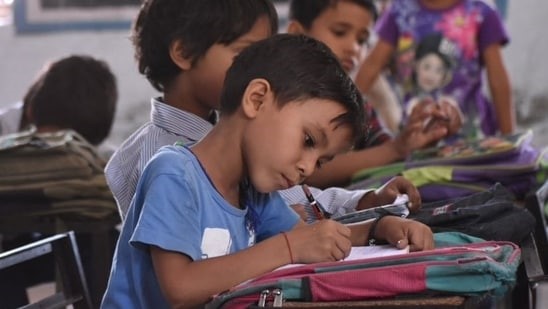Description

Disclaimer: Copyright infringement not intended.
Context
- The National Framework of Early Childhood Stimulation, 2024, underscores a critical aspect of child development: learning begins at birth.
Details
- Ministry of Women and Child Development recently launched:
- a National Framework for Early Childhood Stimulation for Children from Birth to Three Years and
- a National Curriculum for Early Childhood Care and Education for Children from Three to Six Years
SCHEME 1: National Framework for Early Childhood Stimulation 2024
Objective:
- Empower caregivers and Anganwadi Workers for holistic early stimulation.
- Promote optimal development of children, focusing on body and brain development.
Conceptual Framework:
- Based on the Nurturing Care Framework.
- Fills conceptual and practical gaps in understanding care and stimulation.
Core Principles:
Serve and Return:
- Emphasizes responsive interactions between caregiver and child.
Caregiver’s Three Acts:
Positive Guidance:
- Encourages positive reinforcement and guidance.
Activities:
- 36 month-wise age-based activities provided.
- Can be conducted at household, Anganwadi Centre, or Creche.
- Delivered through all contact points including home visits, monthly meetings, and community-based events.
Special Focus:
Screening:
- Early identification of developmental delays or issues.
Inclusion:
- Ensure all children, including Divyang children, are included.
Referrals:
- Provide referrals for further assessment and support.
In a nutshell,
- It outlines a comprehensive set of activities designed to foster holistic development in children from birth to the age of three.
- This framework is aligned with the National Education Policy, 2020, which emphasizes a continuum of learning from the early years.
Importance of Early Years
- Recognizing that 85% of brain development occurs before the age of six, the Ministry emphasizes the importance of a child's early years.
Developmental Milestones and Activities
- The framework emphasizes the importance of engaging children in activities that stimulate their senses and promote cognitive, language, and motor skills development.
- Activities include talking to the child, playing, moving, listening to music, and engaging in sensory stimulation, particularly focusing on sight and touch.
- To cater to the specific developmental needs of children at different stages, the framework provides a month-by-month guide.
- For instance, in the first year, activities involve reaching for objects, imitating sounds, and exploring different textures using household items like cups, bottles, and fabric pieces.
- As the child grows, activities progress to more complex tasks such as feeding themselves, playing with dough, and sorting objects.
Training and Implementation
- Implementation of the framework involves training staff in the 14 lakh anganwadis across the country.
- This training aims to equip caregivers, including parents, anganwadi workers, and ASHA workers, with the knowledge and skills to conduct the prescribed activities effectively.
- By following the guidelines provided in the framework, caregivers can create a stimulating environment that supports the child's overall development.
Early Identification of Developmental Delays
- One of the key benefits of the framework is its focus on early identification of developmental delays.
- By engaging children in age-appropriate activities, caregivers can observe their development closely and identify any delays.
- In such cases, the framework provides guidance on adapting activities to suit the child's needs, ensuring that they receive the necessary support and intervention at an early stage.
Conclusion
- The National Framework of Early Childhood Stimulation, 2024, serves as a comprehensive guide for caregivers to promote optimal development in children during the crucial early years.
- By emphasizing the importance of early learning and providing practical guidance, the framework aims to lay a strong foundation for children's future learning and success.

SCHEME 2: National Curriculum for ECCE 2024: Enhancing Early Childhood Development
Comprehensive Coverage of Development Domains
- The curriculum covers all domains of development, including physical/motor, cognitive, language and literacy, socioemotional, cultural/aesthetic, and positive habits.
- Aligned with the National Curriculum Framework for Foundational Stage 2022 (NCF-FS).
Improving Quality of ECCE
- Aims to enhance the quality of ECCE by prioritizing competency-based lesson plans and activities.
- Activities are presented in a simple and user-friendly manner to facilitate effective implementation.
Focus on Early Learning
- Emphasizes how children learn in the early years, with a focus on playful joy-based learning.
- Designed to prepare children for primary school by developing foundational skills.
Structured Curriculum Design
- Provides a weekly calendar comprising 36 weeks of active learning, 8 weeks of reinforcement, and 4 weeks of initiation.
- Includes 5+1 days of play-based learning in one week, with three blocks of activities in one day.
Diverse Range of Activities
- Offers a combination of activities, including in-center and at-home, indoor and outdoor, child-led, and educator-led activities.
- Ensures a holistic approach to learning and development.
Assessment Tools for Progress Tracking
- Robust assessment tools are provided to track progress, tailor learning, and celebrate each child's unique journey.
- Facilitates continuous monitoring of development milestones.
Focus on Inclusion
- Special focus on the screening, inclusion, and referrals of Divyang children in every activity.
- Ensures that all children, regardless of ability, can benefit from the curriculum.
Community Engagement
- Facilitates community engagement through monthly ECCE days and a continuum of home learning activities for each week.
- Encourages active involvement of parents and caregivers in children's learning and development.
|
PRACTICE QUESTION
Q. Examine the statement that 85% of brain development occurs before the age of six, highlighting its implications for early childhood education. Discuss the existing policies and programs in India aimed at promoting early childhood development. Suggest necessary educational reforms to improve early childhood outcomes.
|
SOURCE: THE HINDU













